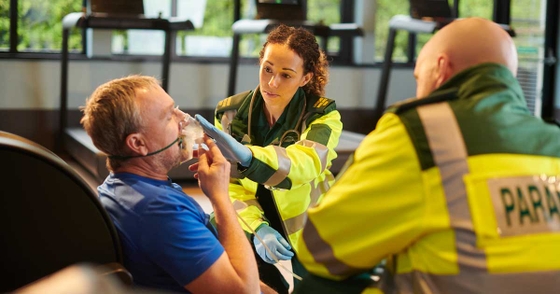
Seven surprising symptoms of heart disease
Blog: 10 August, 2022
You’re probably familiar with some of the more ‘classic’ symptoms of heart disease. Chest pain (angina) which might feel like an uncomfortable pressure or heaviness. Palpitations or sensation of a racing heart. Feeling short of breath or having difficulty breathing.
But did you know heart disease can also cause symptoms affecting other parts of your body? If you’re experiencing any of the symptoms mentioned below, don’t dismiss them as something else. Get them checked out by your GP.
1. Cough
While a cough is a pretty common sign of a chest infection or lung condition, a persistent cough can also be a symptom of heart failure. Heart failure is where the heart doesn’t pump blood around the body as well as it should. When the heart’s not pumping properly, fluid can build up in the lungs, which can cause a cough and sometimes shortness of breath. A cough from heart failure tends to be persistent and you might produce phlegm, which can be white, pink or blood-tinged. It might happen at night when you’re lying down. If you have a cough that’s not going away, or if you ever cough up blood, see your GP right away.
2. Jaw pain/toothache
If you’re experiencing jaw pain, don’t be so quick to chalk it up to a problem with your chompers. Jaw pain, or the feeling of a toothache, can be a symptom of reduced flow of blood to the heart muscle, with the pain radiating from your chest to your jaw. This can be a warning sign of a heart attack or angina. While both women and men can experience this unusual symptom, women are more likely than men to experience jaw pain as a heart attack warning sign. If you’re experiencing jaw pain that doesn’t go away, is getting worse, or if you’re also experiencing other warning signs of a heart attack (like nausea or shortness of breath), call triple zero (000) immediately.
3. Swollen feet and ankles
If you’ve spent a whole day on your feet (especially when it’s hot!), or gone on a long-distance flight, it’s likely you’ve experienced swollen feet and ankles. Fun fact: it’s recommended to buy new shoes in the afternoon when your feet are more on the swollen side!
Having swollen feet and ankles that won’t go away can be a symptom of heart failure. Fluid can build up in the feet and ankles (thanks, gravity) and in some cases, even in the tummy when the heart can’t pump blood around the body efficiently. This is called oedema (pronounced o-deem-a).
If you notice your feet and ankles are often swollen or notice that your socks and shoes are leaving imprints, it’s best to check in with your GP.
4. Dizziness
Ah dizziness, that funny feeling of being on a carnival ride you just can’t get off. The list of causes of dizziness is long, but keep in mind it can be a symptom of an abnormal heart rhythm. An abnormal heart rhythm, or arrhythmia, is caused by an electrical problem in the heart. An example of an abnormal heart rhythm is atrial fibrillation, where the heart beats irregularly and often fast. Along with dizziness, you might experience palpitations, a racing or fluttering heart, shortness of breath, and light headedness. Speak to your GP if you notice these symptoms. If your symptoms are severe, getting worse or not going away, call triple zero (000) for an ambulance.
5. Erectile dysfunction
Coal miners used to take canaries down into coal mines to detect if there were dangerous gases or a lack of oxygen. If the canary died, it was a sign to get out of the mine as soon as possible.Well, think of erectile dysfunction as the ‘canary in the coal mine’ (no budgie smuggler pun intended) of heart disease. Erectile dysfunction is considered an early warning sign because the penis can be affected before the heart is. It’s a vascular organ, and the arteries are much smaller than those in the heart. This means damage can happen in the penis first before other heart disease symptoms develop.
Heart disease and erectile dysfunction share similar risk factors, so the good news (yes, there is some good news) is that if you have (or think you have) erectile dysfunction, this can provide an important window of opportunity to see your GP to check for other risk factors for heart disease, like high blood pressure or high cholesterol. You can do this as part of a Heart Health Check. You can do this as part of a Heart Health Check, which is a 20-minute check up with your GP, subsidised by Medicare, to work out your risk of a heart attack or stroke and to discuss a plan to lower your risk.
6. Leg pains/cramps
We all experience leg cramps every now and then - if you’ve been sitting too long, if you’re playing sport, or if you’re dehydrated. For some people though, lower leg pains and cramps can be a sign of reduced blood flow to the legs. This is a condition called peripheral arterial disease (also known as peripheral vascular disease). Peripheral arterial disease is caused by the same risk factors that cause coronary heart disease. The arteries in the legs can become hardened and narrow, and blood can’t flow through the arteries as easily. When this happens, you might experience a symptom called ‘intermittent claudication’. This is where you might notice a pain or cramp in one or both legs (often in the calf) when walking, which disappears when you stop to rest. Other symptoms of peripheral vascular disease affecting the legs can include numbness, weakness or coldness, a change in colour, loss of hair or ulcers or sores. If you’re noticing any of these symptoms, touch base with your GP. It’s also a good opportunity for them to assess your risk of heart disease as part of a Heart Health Check.
7. Poor sleep
Do you ever feel like you can’t keep your eyes open during the day? Has your partner ever mentioned, or er, complained, that you snore loudly or sometimes even stop breathing during your sleep? Often wake up with a dry mouth or headache? If any of this sounds familiar, you might have a condition called obstructive sleep apnoea. Sleep apnoea happens when the airway becomes partially or completely blocked while you’re sleeping.
People with sleep apnoea have a higher risk of heart and blood vessel problems, including high blood pressure, atrial fibrillation, heart failure, coronary heart disease and stroke. If you have sleep apnoea (or think you might), check in with your GP. Sleep apnoea can also indicate you might have other risk factors for heart disease, like excess body weight.
Remember - if you notice any new symptoms, or anything that’s unusual for you, book in with your GP. It’s also a good chance to book in for a Heart Health Check. People aged 45 years and over, or 30 years and over for Aboriginal and/or Torres Strait Islander Peoples, are eligible.
You might also be interested in...

Is your heart feeling your age?
Have you ever wondered how old your heart is? It might seem like a strange question. Surely your heart is the same age as you? But when we talk about ‘heart age,’ we aren’t talking chronologically...

Heart attack vs cardiac arrest – know the difference
Learn the difference between heart attack and cardiac arrest, their symptoms, survival rates, and prevention tips to help you respond in an emergency.

Alcohol and heart health: your top questions answered
There’s now strong evidence that drinking alcohol doesn’t have any heart health benefits and isn’t recommended as part of a heart-healthy eating pattern.
Last updated02 April 2024